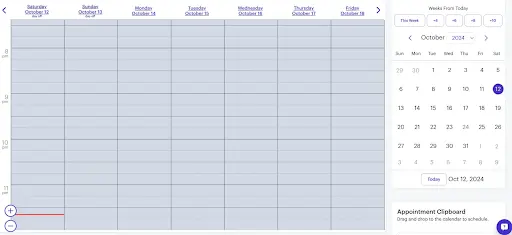Best Scheduling Tools for Meetings for 2025
Efficient scheduling is essential for maintaining productivity and organization in both your personal and professional life. Whether you're a business owner managing client appointments or professional balancing meetings across time zones, having a reliable meeting scheduler is critical. Thankfully, the rise of modern online scheduling tools has made it easier to manage your time effectively.
Why You Can Trust the Expertise of Sonary
At Sonary, we are committed to providing accurate and trustworthy information to help you make informed decisions. Our research process is meticulous, transparent, and guided by a dedication to maintaining the highest standards of integrity, ensuring accurate, real-world insights.
Read more
Unlike many other review platforms, we conduct in-depth evaluations of the software and services we feature. Our expert team tests and actively uses the tools we review to understand their features, performance, and value comprehensively. Our assessments are based on real-world use, giving you insights beyond surface-level descriptions. Our research methodology includes analyzing key consumer factors such as pricing, functionality, device usability, scalability, customer support quality, and unique industry-specific features. This hands-on approach and dedication to transparency mean you can trust Sonary to deliver regular, up-to-date content and recommendations that are well-researched and genuinely helpful for your business needs.
Explore the best scheduling tools designed to streamline your meeting management process, boost productivity, eliminate scheduling conflicts, and provide a hassle-free way for you to coordinate with teams, clients, and stakeholders.
Best Scheduling Tools for Meetings

Features
Scheduling features
Add-Ons
Platforms
Pros & Cons
Pros
Cons

Features
Scheduling features
Add-Ons
Platforms
Pros & Cons
Pros
Cons

Features
Scheduling features
Add-Ons
Platforms
Pros & Cons
Pros
Cons

Features
Scheduling features
Add-Ons
Platforms
Pros & Cons
Pros
Cons

Features
Scheduling features
Add-Ons
Platforms
Pros & Cons
Pros
Cons
Quick Comparison
| Tool | Free Plan/Trial | Key Features | Best For |
| Calendly | Yes | Custom links, integrations | Freelancers, small teams |
| Zoho Bookings | Yes | CRM integration, payments | Service-based businesses |
| Google Calendar | Yes | Syncs with Google Workspace | Personal and professional |
| Square Appointments | Yes | POS payments, staff scheduling | Small service businesses |
| Schedulicity | Yes | Marketing tools, classes | Fitness and beauty pros |
| Microsoft Bookings | No | Reporting, Outlook integration | Enterprise teams |
| Zoom | Yes | Video conferencing, scheduling | Virtual meetings |
Our Top Picks
We’ve rounded up the best scheduling tools to take the hassle out of planning meetings. These tools are designed to help you coordinate with ease, whether it’s setting up one-on-one calls or organizing team meetings. They’re simple, efficient, and packed with features to save you time and keep your schedule on track.
Calendly
 Automate entire appointment booking process
Automate entire appointment booking process  Boost productivity with popular integrations
Boost productivity with popular integrations Calendly is a leading meeting scheduler designed to eliminate the hassle of coordinating meetings and appointments. This intuitive scheduling app has become a go-to solution for professionals, businesses, and teams worldwide. Calendly provides a streamlined, automated approach to finding the perfect time to connect.
Calendly allows users to create personalized booking links that can be shared with clients, colleagues, or prospects. With its seamless integration into popular tools like Google Calendar, Outlook, Zoom, and Salesforce, Calendly ensures that your schedule stays up to date while simplifying the booking process.
The scheduling software’s automation features, such as reminders, follow-ups, and time zone detection, make it a powerful online schedule tool for professionals aiming to maximize their productivity.
Key Features
- Booking links: Share custom links to let invitees schedule without back-and-forth emails.
- Notifications: Automate email and SMS reminders to reduce no-shows and save time.
- Time zones: Automatically adjust availability for invitees’ local time zones.
- Calendar sync: Integrate with Google, Outlook, and Apple Calendar to prevent double bookings.
- Meeting types: Support one-on-one, group, and round-robin scheduling for flexibility.Workflow tools: Connect with Zoom, Slack, and Salesforce for seamless scheduling and collaboration.
- Custom branding: Add logos, colors, and messages to booking pages (premium feature).
- Analytics: Track meeting data and performance to boost productivity and client engagement.

Pros and Cons
- Pros
- Clean, intuitive interface that requires minimal setup and training.
- Automatic reminders, follow-ups, and scheduling workflows save time.
- Supports one-on-one, group, and round-robin scheduling.
- Works seamlessly with popular apps like Zoom, Google Calendar, Slack, and Salesforce.
- Offers a free tier for individuals with basic scheduling needs.
- Cons
- Limited features in free plan
- Premium pricing can become expensive for larger teams or businesses with complex scheduling needs.
- Some users may find setting up advanced workflows or integrations time-consuming.
Who It’s For
Calendly is ideal for freelancers, small teams, and large organizations that need a reliable and user-friendly meeting scheduler to simplify scheduling and enhance productivity.
Zoho Bookings
 Customized booking page shows availability
Customized booking page shows availability  Time zone presets & scheduling intervals
Time zone presets & scheduling intervals Zoho Bookings is an intuitive and comprehensive online appointment scheduling software designed to streamline your booking process and enhance customer experience. Tailored for businesses of all sizes, Zoho Bookings helps eliminate the hassle of manual scheduling, enabling your team to focus on delivering exceptional service.
With Zoho Bookings, you can create a seamless, automated booking system that allows your clients to book appointments, consultations, or services directly from your website, email, or social media platforms. The software integrates effortlessly with your calendar, ensuring real-time updates, reducing scheduling conflicts, and keeping everyone on the same page.
Key Features
- Customizable booking pages: Create branded, user-friendly booking pages that reflect your business identity.
- Real-time sync with calendars: Automatically sync with Google Calendar, Zoho Calendar, or other third-party calendars to keep your schedule accurate.
- Automated notifications: Send automated email or sms reminders to clients, reducing no-shows and keeping communication professional.
- Multi-user access: Perfect for teams, allowing individual staff calendars, resource allocation, and group bookings.
- Team scheduling: Allow multiple users to manage their schedules and enable clients to book with specific staff members or resources.
- Payment integration: Accept payments securely through popular platforms like Stripe, Razorpay, or PayPal at the time of booking.
- Time zone conversion: Ideal for global businesses, ensuring clients and staff can book across different time zones seamlessly.
- Mobile Access: Manage bookings on the go with the Zoho Bookings mobile app.

Pros and Cons
-
Pros
- Intuitive interface for easy scheduling.
- Fully customizable booking pages and workflows.
- Works with Zoho apps and external tools for efficiency.
- Competitive pricing is ideal for small to medium businesses.
- Saves time with notifications and calendar updates.
- Supports multi-user bookings for teams and services.
- Time zone support ensures global accessibility.
- Cons
- Advanced features may require some setup or training.
- The free plan lacks payment integrations and advanced reporting.
- Integrating with non-Zoho tools can be challenging.
- The mobile app has fewer features than the desktop version.
Who It’s For
The Zoho Bookings scheduling tool is best for service-based businesses, health and wellness centers, education providers, customer support teams, and e-commerce or retail businesses that need a seamless, automated solution for managing client appointments and bookings.
Related Articles
Google Calendar
 Sync across all your devices instantly
Sync across all your devices instantly  Integrates with Google Workspace
Integrates with Google Workspace Google Calendar is a widely used online schedule tool that helps individuals and teams stay organized, manage appointments, and coordinate meetings effortlessly. As part of the Google Workspace ecosystem, Google Calendar offers seamless integration with Gmail, Google Meet, and other productivity tools, making it an essential choice for professionals, students, and businesses alike.
With its intuitive interface and powerful features, Google Calendar allows you to create events, share schedules and set reminders across devices. This scheduling app keeps you on track and ensures you never miss an important event.
Key Features
- Event creation: Easily create events with details like time, location, and participants.
- Gmail integration: Automatically add events from your Gmail inbox, such as flight details and bookings.
- Shared calendars: Share your calendar with others to enhance collaboration and scheduling.
- Google Meet integration: Automatically add virtual meeting links for Google Meet directly to calendar events.
- Real-time syncing: Sync across all devices instantly, ensuring your calendar is always up-to-date.
- Recurring events: Schedule repeating events, such as weekly meetings or monthly deadlines.
- Time zone support: Automatically adjust event times based on your and your invitees’ time zones.
- Access control: Set permissions for who can view or edit your calendar and events.
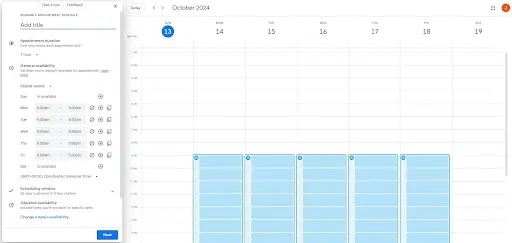
Pros and Cons
- Pros
- Free with a Google account.
- Integrates with Gmail and Google Workspace.
- Works on web, iOS, and Android with sync.
- Shared calendars for team collaboration
- Cons
- Lacks advanced customization and automation.
- No payment integration for bookings.
- Limited compatibility with non-Google tools.
- No support for custom branding.
Who It’s For
Google Calendar is best for individuals, small teams, and organizations that require a simple, accessible, and free scheduling app to manage daily tasks.
Square Appointments
 All-in-one POS for booking & payments
All-in-one POS for booking & payments  Client profiles & team management tools
Client profiles & team management tools Square Appointments is a powerful scheduling app designed specifically for service-based businesses, providing a seamless way to manage appointments, payments, and staff schedules all in one platform. this online schedule tool combines robust scheduling features with integrated point-of-sale (POS) capabilities.
Square Appointments offers user-friendly tools for business owners to manage their schedules, accept payments directly, and even send automated reminders to reduce no-shows.
Key Features
- Online booking system: Clients can book services online through a customizable booking page — available 24/7.
- Integrated payment processing: Accept payments directly through the platform, including deposits and prepayments for appointments.
- Staff scheduling: Manage staff calendars and allow clients to book with specific team members based on availability.
- Point-of-Sale (POS) integration: Syncs with Square’s POS system for easy transaction management and reporting.
- Automated reminders: Send email or text reminders to reduce no-shows and keep clients informed.
- Inventory management: Track and manage product inventory, making it perfect for businesses selling retail items.
- Reports and analytics: Access detailed business insights, including appointment trends and revenue reports.
- Mobile access: Manage your business on the go with the Square Appointments mobile app for iOS and Android.
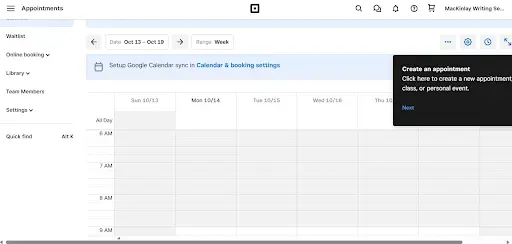
Pros and Cons
- Pros
- Combines scheduling, payments, and staff management.
- Free plan for individuals with key features.
- Built-in payment processing for secure transactions.
- Customizable booking pages for branding.
- Supports multi-staff scheduling for teams.
- Accessible on desktop, iOS, and Android.
- Cons
- Team plans can be costly for larger businesses.
- Limited integration with non-Square tools.
- Advanced features have a learning curve.
- Primarily designed for service businesses.
Who It’s For
Square Appointments is best for service-based businesses, such as salons, spas, fitness studios, and consultants, that need a reliable and scalable online schedule tool with built-in payment processing and staff management features.
Schedulicity
 Manage appointments and clients in one place
Manage appointments and clients in one place  Intuitive interface and easy to use
Intuitive interface and easy to use Schedulicity is an all-in-one scheduling app designed specifically for service-based professionals and businesses. With a focus on simplicity and efficiency, Schedulicity makes it easy to manage appointments, classes, and workshops while providing tools to grow your business.
More than just a meeting scheduler, Schedulicity combines appointment management with integrated payment processing and marketing tools, allowing businesses to promote their services, accept payments, and attract new clients—all from one platform.
Key Features
- Customizable booking pages: Create branded, user-friendly booking pages that reflect your business identity.
- Real-time sync with calendars: Automatically sync with Google Calendar, Zoho Calendar, or other third-party calendars to keep your schedule accurate.
- Automated notifications: Send automated email or sms reminders to clients, reducing no-shows and keeping communication professional.
- Multi-user access: Perfect for teams, allowing individual staff calendars, resource allocation, and group bookings.
- Team scheduling: Allow multiple users to manage their schedules and enable clients to book with specific staff members or resources.
- Payment integration: Accept payments securely through popular platforms like Stripe, Razorpay, or PayPal at the time of booking.
- Time zone conversion: Ideal for global businesses, ensuring clients and staff can book across different time zones seamlessly.
Pros and Cons
- Pros
- Combines scheduling, payments, and marketing.
- Customizable for individual and group services.
- Mobile-friendly for on-the-go management.
- Includes waitlists and reminders to reduce no-shows.
- Free basic plan for small businesses.
- Cons
- Free plan lacks advanced tools.
- Premium plans can be costly for larger teams.
- Best suited for service-based industries.
- Advanced tools may require a learning curve.
Who It’s For
Schedulicity is best for service-based professionals and businesses, such as hairstylists, yoga instructors, fitness trainers, and massage therapists, who need a user-friendly and comprehensive scheduling app.
Microsoft Bookings
 Microsoft 365 suite integration
Microsoft 365 suite integration  Instant notifications for appointments and follow-ups
Instant notifications for appointments and follow-ups Microsoft Bookings is a robust scheduling app designed to streamline appointment booking for businesses and organizations. As part of the Microsoft 365 suite, it integrates seamlessly with tools like Outlook and Microsoft Teams, offering a unified platform for managing client appointments, internal meetings, and team schedules.
Microsoft Bookings allows clients and colleagues to schedule appointments through a centralized online booking page, which can be customized to reflect your business’s branding and services, with automated notifications, reminders, and rescheduling options.
Key Features
- Online booking page: Create a customizable booking page where clients can view availability and book appointments directly.
- Microsoft 365 integration: Seamlessly connect with Outlook and Microsoft Teams to synchronize calendars and enable virtual meetings.
- Automated notifications and reminders: Send email confirmations and reminders to reduce missed appointments and improve communication.
- Staff scheduling management: Assign and manage staff availability to ensure clients are matched with the right team member.
- Rescheduling and cancellation options: Allow clients to make changes to their appointments without the need for manual intervention.
- Analytics and reporting: Provide insights into booking trends, staff performance, and client behavior to optimize operations.
- Mobile app: Manage bookings, view schedules, and interact with clients on the go via the Microsoft Bookings app for iOS and Android.
- Multi-service support: List multiple services with unique availability and booking requirements.
- Custom branding: Add your logo, colors, and business details to create a professional and personalized booking experience.
- Time zone management: Automatically adjusts appointments for clients and staff in different time zones.
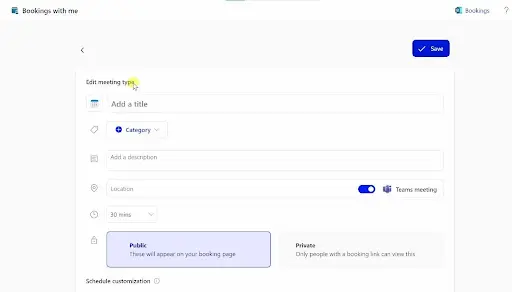
Pros and Cons
- Pros
- Integrates seamlessly with Microsoft 365 tools.
- Customizable, branded booking pages.
- Automates notifications and rescheduling.
- Comprehensive team management features.
- Accessible on desktop and mobile apps.
- Enterprise-level security for data protection.
- Cons
- Requires a Microsoft 365 subscription.
- Setup can be complex for new users.
- Limited integrations outside Microsoft tools.
- Designed mainly for service businesses.
- Costly for small businesses with tight budgets.
Who It’s For
Microsoft Bookings is best for service-based businesses, healthcare providers, educational institutions, and organizations already using the Microsoft 365 ecosystem.
Zoom
 Designed with business ease in mind
Designed with business ease in mind  Smart collaboration tools
Smart collaboration tools Zoom is a leading platform for video conferencing and collaboration. It offers powerful scheduling capabilities to simplify the planning and execution of virtual meetings.
Renowned for its reliability and ease of use, Zoom integrates seamlessly with popular scheduling apps like Google Calendar, Outlook, and Calendly, making it a cornerstone tool for businesses, educators, and individuals alike.
Key Features
- Calendar integration: Integrate Zoom with Google Calendar, Outlook, and iCal, allowing businesses to schedule and manage meetings directly from their calendar.
- Recurring meeting options: Schedule meetings that repeat daily, weekly, or monthly with consistent meeting links and settings.
- Automated meeting links: Generate unique meeting links for each session, ensuring security and easy access for participants.
- One-click scheduling: Create meetings directly from the Zoom app or browser extension for rapid planning.
- Time zone adjustments: Automatically adjust meeting times to reflect participants’ local time zones for global scheduling.
- Personal meeting ID (PMI): Use a static meeting ID for recurring sessions, perfect for frequent meetings with the same participants.
- Waiting rooms: Manage participant entry with customizable waiting rooms for enhanced control.
- Reminders and notifications: Send automated reminders and updates to participants before meetings.
- Integration with scheduling apps: Works with tools like Calendly and Doodle to streamline scheduling workflows.
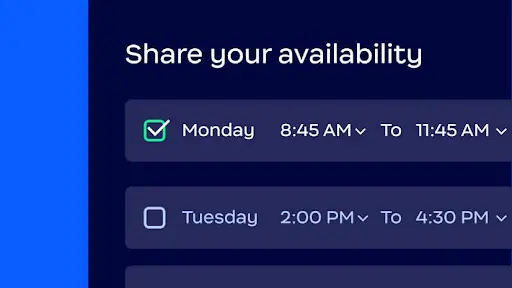
Pros and Cons
- Pros
- Integrates with popular calendar apps.
- Offers flexible scheduling options.
- Adjusts to global time zones.
- Secure with unique links and waiting rooms.
- Available on desktop, mobile, and web.
- Supports automation with tools like Calendly.
- Cons
- Free plan limits group meetings to 40 minutes.
- Advanced features may overwhelm beginners.
- Limited deep integration with non-calendar tools.
- Premium features require paid plans.
Who It’s For
Zoom is perfect for scheduling and hosting virtual meetings, recurring sessions, and global collaboration. It is ideal for managing these with ease.
Why Do You Need Meeting Scheduling Tools?
Time is a finite resource, and managing it effectively is a cornerstone of personal and professional success. Whether you’re coordinating meetings with a global team or managing client appointments, a meeting scheduler can be a game-changer. Here’s why having the best scheduling tools is essential:
1. Saves time and increases efficiency
One of the biggest advantages of using a scheduling app is the time it saves. Instead of exchanging multiple emails or phone calls to find a mutually convenient time, you can use an online schedule tool to automate the process. By simply sharing your availability, others can book meetings or appointments without the hassle.
For example:
- Calendly lets users send a personalized booking link, making the process seamless.
- Zoho Bookings integrates payment options, so clients can schedule and pay in one step.
2. Improves organization
With a meeting scheduler, all your appointments are consolidated into one place, ensuring you never miss a meeting or double-book yourself. Tools like Google Calendar and Microsoft Bookings sync appointments across devices, giving you real-time updates and notifications to stay organized.
3. Enhances professionalism
A professional scheduling app not only simplifies booking but also leaves a positive impression on clients and collaborators. Customizable booking pages, automated reminders, and integrated payment systems elevate your service, making you appear more organized and client-focused.
4. Facilitates global collaboration
Scheduling across time zones can be a nightmare, especially for remote teams. Tools like Zoom, Calendly, and Microsoft Bookings have built-in time zone management, ensuring everyone’s availability is accurately displayed.
5. Reduces errors
Manual scheduling often leads to mistakes like missed appointments or incorrect times. Scheduling tools automate the process and reduce human error by syncing directly with your calendar.
6. Improves client experience
For businesses, providing clients with an easy way to book appointments can be a significant competitive advantage. Tools like Square Appointments and Schedulicity allow clients to self-schedule, select services, and even pay—all without waiting for a response.
By incorporating meeting scheduling tools into your workflow, you not only save time but also improve the experience for everyone involved.
Key Features to Look for in a Scheduling App
When choosing a scheduling app, look for features that ensure convenience, efficiency, and scalability. The essential features include:
1. Customizable booking pages
Adding your logo, brand colors, and tailored messaging to your booking pages ensures that your booking pages reflect your brand’s identity.
2. Real-time calendar sync
Calendar synchronization is a must-have feature to ensure all appointments are updated in real-time. Look for an app that integrates with popular calendars like Google Calendar, Outlook, or Apple Calendar.
3. Automated notifications and reminders
Keep clients informed about their upcoming appointments by using automated email and SMS reminders. Choose a scheduling app that offers customizable reminders, including appointment details, rescheduling links, and personalized thank-you messages.
4. Multiple user and team support
For team-based businesses, select an app that allows multiple users and team management. Clients can book specific services or staff while individual team members manage their schedules. Because each member has a unique skill set, salons, consulting firms, and fitness centers can benefit from it.
5. Payment integration
A scheduling app with built-in payment processing simplifies your workflow by letting clients pay for appointments directly during booking. Popular integrations include Stripe, PayPal, and Razorpay, ensuring secure transactions.
6. Automation
The right automation features can streamline operations and improve appointment management by handling repetitive tasks with minimal manual effort.
7. Mobile access
A mobile-friendly app ensures you can manage your bookings on the go, whether you’re traveling or away from the office. With a mobile app or responsive web interface, you can view, edit, or cancel appointments, communicate with clients, and monitor your schedule in real-time from your smartphone or tablet.
8. Time zone support
For businesses that cater to international clients or remote teams, time zone support is critical. A scheduling app with automatic time zone conversion eliminates confusion by displaying appointments in the client’s local time. This ensures a smooth booking experience for both clients and team members, regardless of location.
9. Analytics and reporting
An effective scheduling app should provide insights into your appointment data through detailed analytics and reporting tools. These tools can track metrics like the number of bookings, peak hours, revenue generated, and customer preferences.
10. Third-party integrations
Consider scheduling apps that integrate with CRMs (like Zoho CRM or Salesforce), email marketing tools (like Mailchimp), and other business apps. These integrations share customer information, appointment updates, and payment details seamlessly.
Choosing the Right Meeting Scheduler for Your Needs
With so many scheduling tools available, picking the right one can feel overwhelming. The right choice depends on your specific needs, the size of your team, and the type of meetings or appointments you manage. Here are some factors to consider:
1. Define your purpose
- For personal use: If you’re an individual looking for basic functionality, tools like Google Calendar or Calendly’s free tier are excellent options.
- For small businesses: Service-based businesses may benefit from Square Appointments or Schedulicity due to their integrated payment features.
- For teams: Tools like Microsoft Bookings or Zoho Bookings offer advanced multi-user scheduling and team management options.
2. Evaluate your budget
- Determine how much you’re willing to spend. Free options like Google Calendar and free plans from Calendly or Schedulicity are great for those on a tight budget.
- For those who need advanced features, consider affordable premium options like Zoho Bookings ($6/month) or Calendly ($8/month).
3. Consider integration needs
- Ensure the scheduling app integrates with the tools you already use. For example:
- Zoom works seamlessly with tools like Calendly and Google Calendar for scheduling virtual meetings.
- Zoho Bookings integrates with Zoho CRM for a streamlined client management experience.
4. Look for scalability
- If you anticipate growth, choose a tool that can scale with your business. Tools like Microsoft Bookings and Square Appointments offer scalable plans for larger teams.
5. Test before committing
- Many tools offer free trials or basic plans. Take advantage of these to test functionality and compatibility before committing to a paid subscription.
By assessing your specific needs and priorities, you can confidently choose the best scheduling software for your personal or professional goals.
Final Thoughts
Implementing a scheduling app can save you hours of administrative work, reduce errors, and make you more professional in the eyes of clients and colleagues. Each tool offers unique features tailored to different needs, so take advantage of free trials or free tiers to find the one that works best for you.
In 2024, efficiency and time management are no longer luxuries — they’re necessities. By adopting the right meeting scheduling tools, you can focus on what truly matters: growing your business, strengthening your relationships, and achieving your goals.
FAQ
Q: What is a scheduling app, and how does it work?
A: A scheduling app is a software tool that helps individuals and businesses organize and manage appointments, meetings, and tasks. These apps typically include features like online booking pages, calendar integrations, automated reminders, and payment processing.
Q: Can scheduling apps integrate with my existing tools?
A: Yes, most modern scheduling apps integrate with popular tools like Google Calendar, Outlook, Zoom, and CRM systems like Salesforce or Zoho CRM.
Q: Are there free scheduling apps?
A: Yes, there are free scheduling apps like Google Calendar, Calendly (free tier), and Schedulicity (basic plan). These free plans often include essential features like calendar synchronization, basic reminders, and limited booking options.
Q: Can scheduling apps handle recurring appointments?
A: Yes, most scheduling apps support recurring appointments, allowing you or your clients to schedule repeat sessions (e.g., weekly or monthly meetings).

